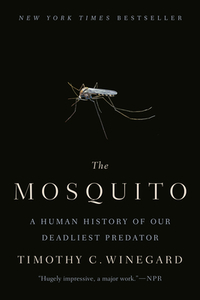Take a photo of a barcode or cover
Put it aside, too much historic battles and little added value in the mosquito. Too many repetitions too
informative
slow-paced
why are we stretching soooo far and talking about everything but mosquitos
Tedious. Ridiculous tenuous links to anything to do with mosquitos and history's major events.
adventurous
informative
medium-paced
Terribly pre-Covid 19 we were. Just squeaked by, with public health catastrophes loose, really. Unfun at times honestly too, I actually almost quit, but swell enough for a new history. I appreciate the quick clip Winegard has. "her global ascendancy" -- so we're personifying it as a female, like a ship, ok, hmm -- "was created by corresponding historical events both naturally and socially induced" (27). Huh, ok. That's a pretty basic thesis for the whole book I suppose, but you do you, gargantuan researcher, etc.
"history does not warehouse well in neatly labeled boxes, for events do not exist in quarantined isolation" (45). Hehe, huh, ok. So it's like the end of Raiders of the Lost Ark. Through Ancient Greece, Alexander the Great, Ancient Rome, and tons of other points we go!
The slips are many but forgivable. Describing George Lucas as a 'guru' (101), 'consolation prize' confused for "conciliation prize" (177), awkwardly mentioning Christianity ("proliferation of Christianity. This new faith, which began as a splinter camp or 'Jesus Movement' within Judaism in the first century" (182): questionable, but ok. 😇 Hehe)
Actually, I do enjoy the saucy way Christian devotion is dealt with sometimes, like when Rome comes up during chapter 5: "Catholics regarded their spiritual headquarters with more terror than respect, or perhaps respectful terror" (191). Or when Charlamagne was a genocidaire: "While not officially considered part of the Crusades, Charlemagne’s zealous and fanatical Christianization of his conquered subjects was so extreme it could be defined as religious genocide" (198).
But Chapter 7 is when we 'open' the Columbian Exchange as it were, and when it feels like the clip of simple, fine, well-sketched western civilization starts to unroll in plain Chicago style. Huge, elaborate, less-familiar copses of history cut down and tied up into plainer packages. Quinine, slavery, cutting toward the interior of Africa. I appreciate how we mention the origin of 'redskin' (322) and the 'truth' of Pocahontas (347), though it's a little awkward how we're suddenly micro-focused, just on whims.
There are mountains of history, wars; but it seems especially odd to me how we screech willy-nilly through the 20th century, skipping World War I completely but then going back to it after a brief mention of World War II and the Cold War. The last time I checked, history went chronologically one direction, front-to-back if you're looking at it that way (depart at your own risk), etc.
Dr. He Jiankui's CRISPR stuff, and other 'right up until press time' developments, play us right up to the end of Winegard's book, huh? He writes about "the mind-boggling statistics and loss of life surveyed in this book", and he sympathizes with those who find it nearly impossible to humanize or sympathize with the mosquito. But, like, I'm still asking, even after the whole frickin book, can't we just obliterate them all?? Ha, there's tons and they're tricky, but surely by 1975 or so there'd be someone clever enough to vanquish them.
dark
informative
slow-paced
Dull reading. While the pivot points in history due to malaria and yellow fever were enlightening, it became more and more repetitive as the book dragged on. It felt like reading a drawn-out list of events that the mosquito influenced rather than an engaging historical narrative.
I was planning on listening while working but listened to podcasts instead this didn’t hold my attention.
informative
medium-paced
I hoped this book would offer an extraordinary perspective on history. It turned out to be a predominantly military history of the (western) world and the influence of mosquito-borne diseases like yellow fever, dengue and malaria on it. Unfortunately light on epidemiology and pathology.





